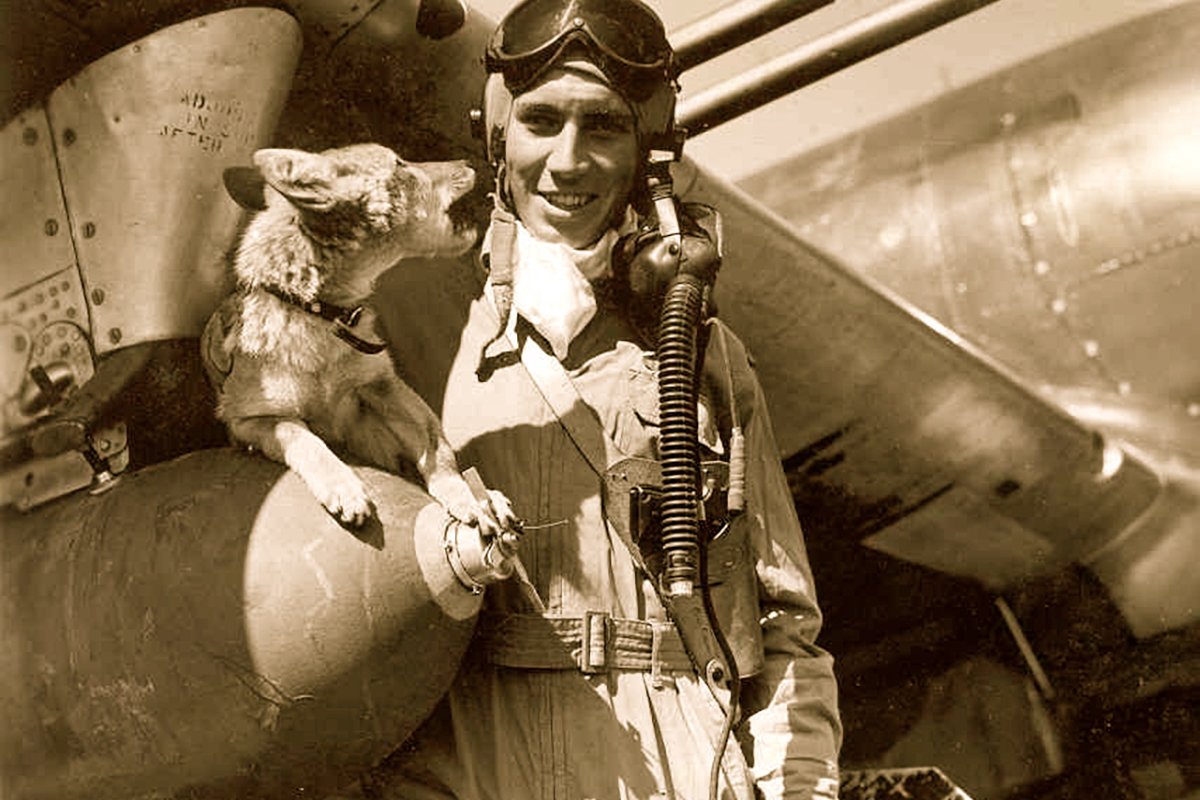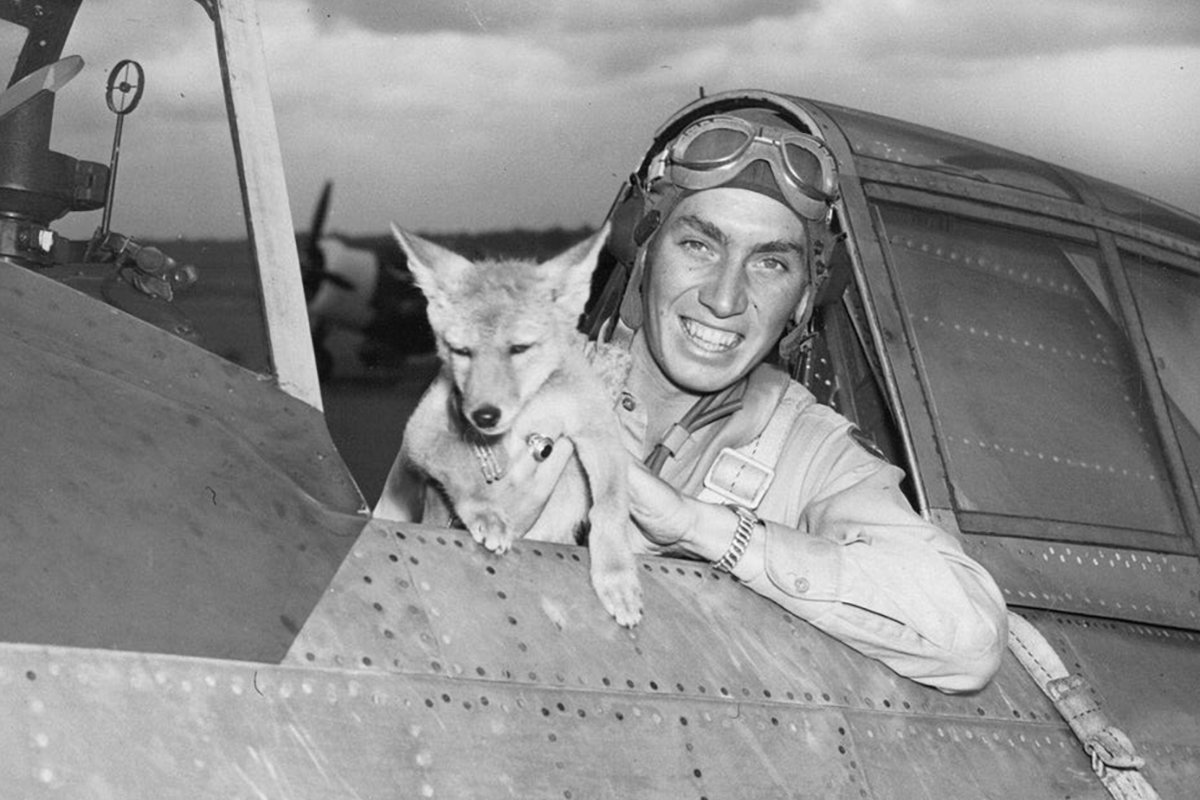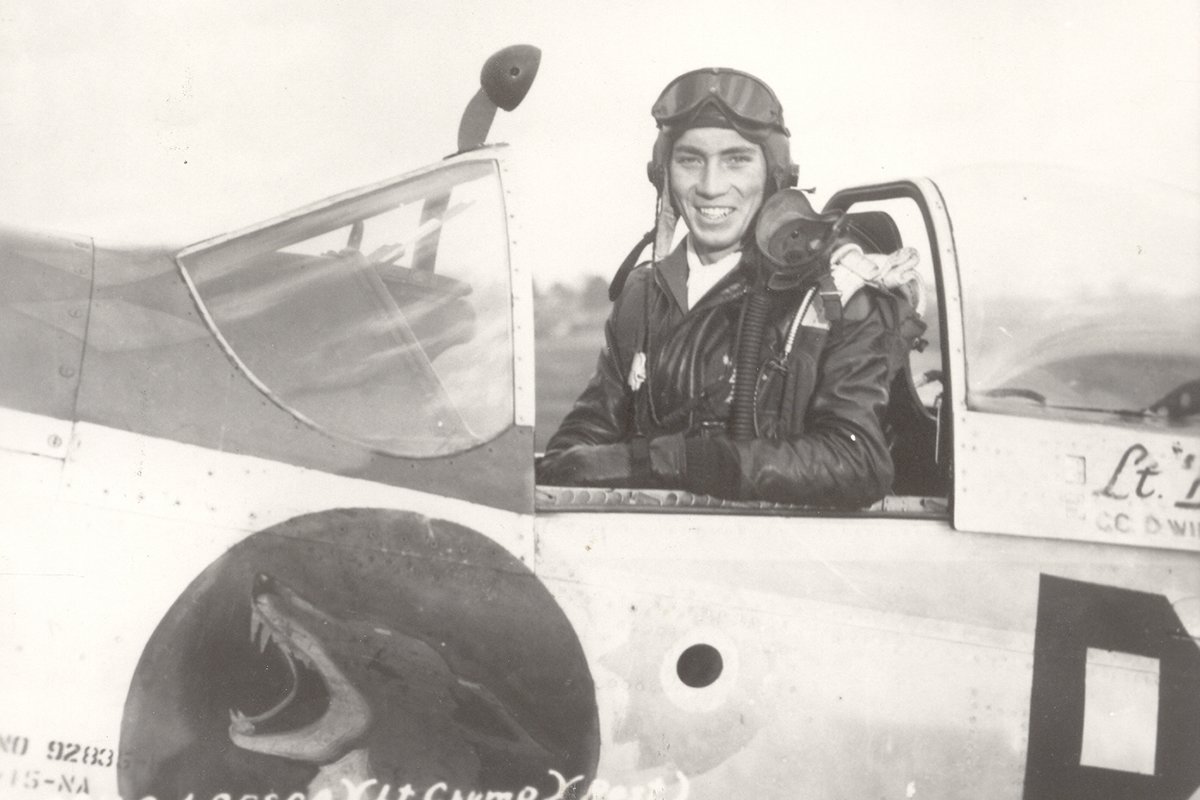The 4-Legged Fighter Pilot: Why a Coyote Named Jeep Was Buried With Full Military Honors

John “Wild Bill” Crump and Jeep pose for a photo next to Crump’s P-47 Razorback. Jeep is lying on a 500-pound bomb. Wild Bill went on to transition into the P-51 and logged 311 combat hours, which consisted of 77 missions, mostly strafing, flak-busting, and flying escort. Photo courtesy of wildbillcrump.com.
In 1944, John “Wild Bill” Crump, a 20-year-old aviation enthusiast and Washington native, arrived at Harding Field in Nebraska to complete his US Army Air Force pilot training. While earning his pilot wings, Crump discovered the most unlikely of co-pilots: a 2-week-old coyote pup he named “Jeep,” a nod to Popeye’s pet with supernatural abilities. The pair were soon inseparable.
Crump took Jeep to Baton Rouge for P-47 training. Together, they became more accustomed to flying fighter aircraft. When Crump received orders to England, he smuggled Jeep aboard the RMS Queen Elizabeth, a luxury ocean liner converted into a troop transport ship.

Jeep accompanied Crump to RAF Martlesham Heath Airfield in Ipswich, England. The coyote quickly became the mascot of the 360th Fighter Squadron, 356th Fighter Group. To make his membership official, members of the air combat unit supplied Jeep with his own “dog tags,” a pilot’s logbook, and an immunization record. Jeep even entertained the pilots during howling competitions.
Despite his mascot status, Jeep did a little more than boost morale — he joined in on the action. On at least five combat sorties, Jeep sat at Crump’s feet in the cockpits of his P-47 Razorback and P-51 Mustang aircraft. He was the only coyote in World War II to fly combat missions.
Sadly, the four-legged aviator didn’t make it back to the United States with his owner. On Oct. 28, 1944, Jeep was killed when a military vehicle accidentally ran him over. Jeep was buried with full military honors; his gravesite rests on the grounds at Playford Hall in Ipswich, England.

Crump logged 311 combat hours and 77 combat missions piloting “Jackie,” the P-51 Mustang he named after his high school sweetheart. On the side of his aircraft’s fuselage was a picture of Jeep in honor of their shared service.
Although Crump survived the war and was discharged in 1948, he re-enlisted to participate in the Berlin Airlift. In 1954, he also led a squadron of nine C-124 Cargo Masters from Indochina to France, assisting the French in what was, at that time, the longest troop airlift in history. After his military service, Crump became an air show performer and supported community service initiatives in his home state of Washington.
Read Next: Mutt the Cigarette-Delivering French Bulldog & Other Animals of World War I

Matt Fratus is a history staff writer for Coffee or Die. He prides himself on uncovering the most fascinating tales of history by sharing them through any means of engaging storytelling. He writes for his micro-blog @LateNightHistory on Instagram, where he shares the story behind the image. He is also the host of the Late Night History podcast. When not writing about history, Matt enjoys volunteering for One More Wave and rooting for Boston sports teams.
BRCC and Bad Moon Print Press team up for an exclusive, limited-edition T-shirt design!
BRCC partners with Team Room Design for an exclusive T-shirt release!
Thirty Seconds Out has partnered with BRCC for an exclusive shirt design invoking the God of Winter.
Lucas O'Hara of Grizzly Forge has teamed up with BRCC for a badass, exclusive Shirt Club T-shirt design featuring his most popular knife and tiomahawk.
Coffee or Die sits down with one of the graphic designers behind Black Rifle Coffee's signature look and vibe.
Biden will award the Medal of Honor to a Vietnam War Army helicopter pilot who risked his life to save a reconnaissance team from almost certain death.
Ever wonder how much Jack Mandaville would f*ck sh*t up if he went back in time? The American Revolution didn't even see him coming.
A nearly 200-year-old West Point time capsule that at first appeared to yield little more than dust contains hidden treasure, the US Military Academy said.












